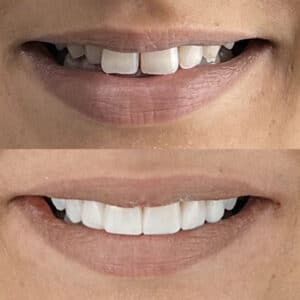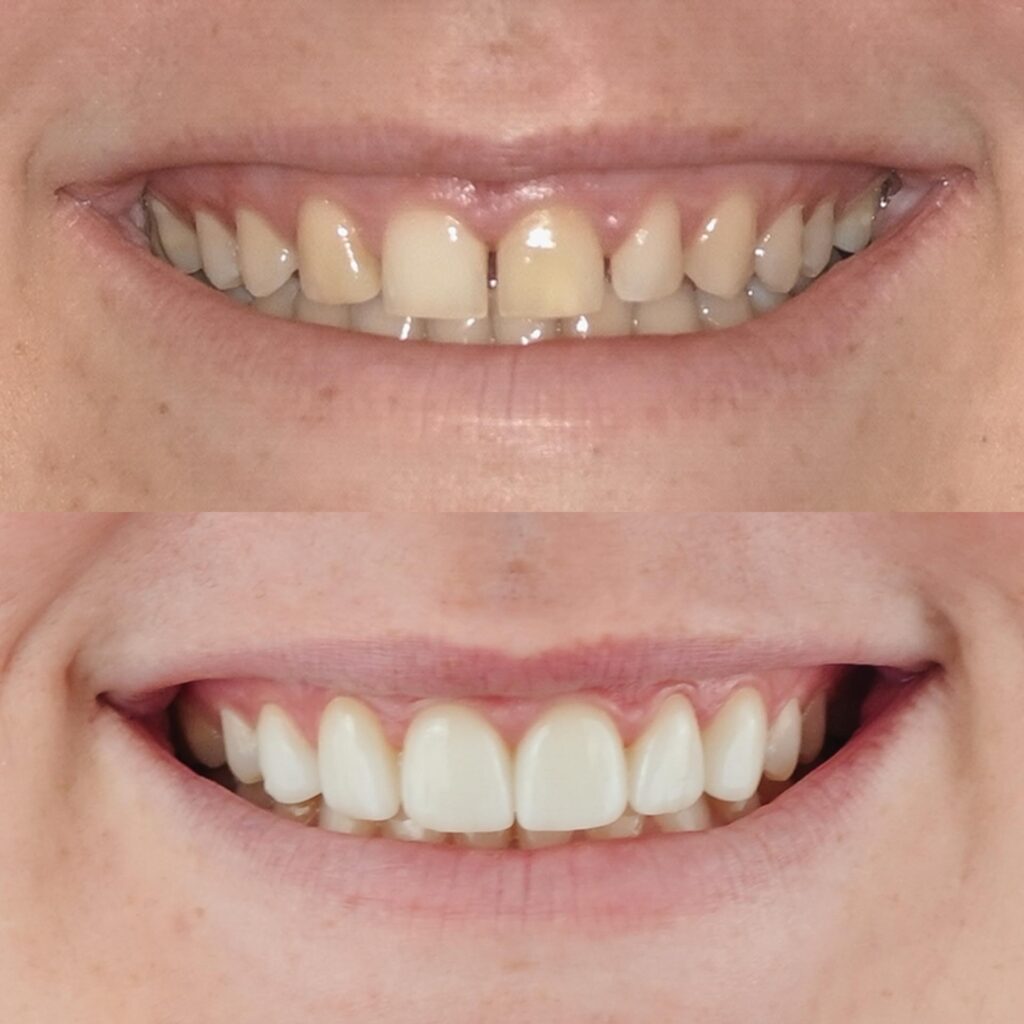Everybody wants a beautiful smile. It can change how you look and feel, giving you the confidence boost you need to smile happily every day.
There is a vast range of treatments that dentists can give to make you smile the way you want. But restoring your natural appearance may not be possible if the teeth are damaged or discolored. In such cases, dentists often recommend veneers. They are thin shells of porcelain that rest on the teeth to cover up damages like stains or chips, giving the dentist an ideal chance to correct your teeth’ shape and size. Here we’ll tell you everything about dental veneers and how they can help make your teeth look beautiful like never before.
What are Dental Veneers?
Dental veneers are thin shells of tooth-colored material designed to cover the front surface of a tooth to improve its appearance. They can be made from porcelain or composite resin. Veneers can correct cosmetic issues related to teeth, such as crooked teeth, discoloration, or misshapen crowns.
Veneers can be custom-made to create the desired smile, taking into account shape, size, and color. This can help to make the perfect smile for any individual. Veneers are a permanent dental treatment, and their color cannot be altered after application. As with all dental treatments, veneers may cause temporary discomfort as the material adjusts to the surface of the teeth. However, they can help improve the overall appearance of your teeth and should not be a long-term solution to cosmetic dentistry issues.

Benefits of Dental Veneers
Dental veneers are a cosmetic dental treatment made of composite material that is cemented to the teeth to alter the appearance and function of the dentures. They can improve the appearance of the smile by covering worn or damaged teeth, providing a restored surface for functional teeth, or crowning the teeth with aesthetically pleasing porcelain crowns. Veneers are durable, disease-resistant, and easy to maintain. They can last years and require minimal dental care.
Dental veneers are one of the most reliable cosmetic dental treatments for improving the appearance of teeth. They can cover worn or damaged teeth, provide a restored surface for functional teeth, or crown your teeth. Veneers can correct any smile issue, from minor orthodontic problems to severe dental health issues such as missing teeth or dental abnormalities. Cosmetic dentistry can also be an effective way to cover teeth that have been whitened or veneers. Veneers are custom-made to fit each individual’s mouth and can be adjusted as the patient’s face grows and changes with age.
Thus, dental veneers are a reliable and effective cosmetic dental treatment for improving the smile’s appearance.
How to Prepare for Veneer Placement?
To prepare for dental veneer treatment, your dentist will ask about your dental history and oral health. They may also want to look at some of your teeth to see if veneers are appropriate. Once you know what type of veneer is being considered, the dentist can begin the necessary consultations to discuss treatment options and porcelain crowns that might match your individual smile best!
The dentist will ask you to abstain from drinking water and eating solid foods for 12 hours before the veneer placement. Also, avoid brushing your teeth or flossing on the day of the appointment. Veneers are thin, custom-made shells of porcelain or composite material placed on the teeth to beautify and protect them. Before placement, teeth may be recontoured to the desired shape, and temporary veneers may be provided to protect the teeth from dental decay. An impression of the teeth is taken to create the veneer, which can take up to two weeks to be ready.
The dentist visits and fitting appointment involves removing the temporary veneer and placing the final veneer. The veneer material can be porcelain or composite and last for a few years. The dentist can recommend veneer types based on the tooth’s natural dentition and the patient’s lifestyle and dental needs.
How to Take Care of Your New Smile?
Make sure to brush and floss daily to maintain your veneers. Avoid coffee and other staining foods. Consider having your veneers polished regularly to keep them looking smooth and healthy. Consider gently brushing your veneer with a special toothbrush between dental visits to remove stains. This will help to keep the veneer clean and shinier. Wear a mouthguard if you participate in contact sports like soccer or hockey. This can protect your veneers from getting damaged or knocked off during the game. Contact your dentist immediately if you experience any dental problems, such as toothaches or gum disease. Otherwise, continue to follow the care instructions that came with your veneers.
Follow up with your dentist after several weeks to check that your gums and bite are responding properly to the new additions to your teeth. Doing this will ensure that the veneer stays securely in place and is healthy and attractive overall.

Types of dental veneers
Traditional veneers are the most common type of dental veneer. They are made of composite material and are cemented to the teeth using a resin-based adhesive. The composite material is molded to your dentist’s specifications and then cured in a machine that creates the final veneer.
A crown veneer is a more expensive type of dental veneer that classifies as a porcelain crown.
Crowns can also be made from composite material, but they’re different than regular veneers in two ways: first, crowns don’t have any support around the edges; second, crowns require porcelain bonding on top so that they look like natural teeth. Both types of veneers can be whitened, but crowns are usually whiter because the porcelain material helps to reflect light.
Semi-permanent Veneers Semi-permanent veneers can last anywhere from six to twelve months and are cemented onto the teeth using a resin-based adhesive that hardens over time. The veneer is then trimmed flush with the natural tooth surface.
Permanent Veneers Permanent veneer is the most natural-looking type of dental veneer. It’s made of porcelain and is cemented to the teeth using a resin-based adhesive that hardens over time. The veneer can be whitened, but it won’t change with your teeth’s color over time as semi-permanent veneers can. Porcelain is often chosen for its natural appearance and durability. Permanent veneers can last anywhere from eight to twelve years but may need to be replaced after a certain amount of time if the resin bonding begins to wear down.
Each dental veneer has its benefits and drawbacks, so it’s important to discuss the options with your dentist before deciding.
How long does it take for dental veneers to work?
Typically, dental veneer crowns last between 7 to 15 years with proper care and maintenance. Some types of veneers are reversible and can be used multiple times. These types of veneers can last between 3 to 10 years. The types of veneers available vary depending on the aesthetic outcome desired by the dentist, and dentures can be substituted if dental veneers aren’t necessary. Proper oral hygiene is essential to ensure the longevity of veneers. Patients must follow the dentist’s instructions regarding brushing and flossing to avoid teeth erosion and gum damage. Also, patients should refrain from biting Their teeth or chewing gum heavily.
To get the most out of dental veneers, the dentist will assess your oral health and teeth to determine which type of veneer is best for you. The dentist will also discuss the cosmetic outcome and the time you want to have the veneer. Proper care and maintenance of dental veneers can help them last longer and enhance your smile for years to come. Visiting the dentist for check-ups and cleanings can help prevent dental problems that can damage veneers, such as teeth grinding or tooth decay. If veneers become detached from the teeth, patients can seek professional dental care immediately to restore them to their original position as quickly as possible.
Conclusion
Dental veneers are restorative dental treatments that can correct minor teeth flaws such as stains, uneven teeth, or uneven gumline. They can be shaped to match the natural tooth form and provide a smoother appearance to the teeth’ surface. Depending upon the condition of the teeth, they can last anywhere from one to three years. If the veneer is well-shaped, the results can be long-lasting.
Our dentist at Redlands Gentle Dental Care will carefully assess your oral health and teeth to determine the best veneer for your needs. You should expect to visit our office at least once a year for check-ups and dental cleanings to maintain your veneers in good condition












